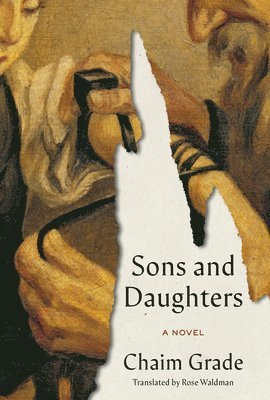Ny

529:-
Tillfälligt slut online – klicka på "Bevaka" för att få ett mejl så fort varan går att köpa igen.
From “one of the greatest—if not the greatest—contemporary Yiddish novelists” (Elie Wiesel), the long-awaited English translation of a work, Tolstoyan in scope, that chronicles the last, tumultuous decade of a world succumbing to the march of modernity
“It is me the prophet laments when he cries out, ‘My enemies are the people in my own home.’” The Rabbi ignored his borscht and instead chewed on a crust of bread dipped in salt. “My greatest enemies are my own family.”
Rabbi Sholem Shachne Katzenellenbogen’s world, the world of his forefathers, is crumbling before his eyes. And in his own home! His eldest, Bentzion, is off in Bialystok, studying to be a businessman; his daughter Bluma Rivtcha is in Vilna, at nursing school. For her older sister, Tilza, he at least managed to find a suitable young rabbi, but he can tell things are off between them. Naftali Hertz? Forget it; he’s been lost to a philosophy degree in Switzerland (and maybe even a goyish wife?). And now the rabbi’s youngest, Refael’ke, wants to run off to the Holy Land with the godless Zionists.
Originally serialized in the 1960s and 70s, in New York-based Yiddish newspapers, Chaim Grade’s Sons and Daughters is a precious glimpse of a way of life that is no longer—the rich, Yiddish culture of Poland and Lithuania that the Holocaust would eradicate. We meet the Katzenellenbogens in the tiny village of Morehdalye, in the 1930s, when gangs of Poles are beginning to boycott Jewish merchants and the modern, secular world is pressing in on the shtetl from all sides. It’s this clash, between the freethinking secular life and a life bound by religious duty—and the comforts offered by each—that stands at the center of Sons and Daughters.
With characters that rival the homespun philosophers and loveable rouges of Sholem Aleichem and I. B. Singer—from the brooding Zalia Ziskind, paralyzed by the suffering of others, to the Dostoevskian demon Shabse Shepsel—Grade’s masterful novel brims with humanity and with heartbreaking affection for a world, once full of life in all its glorious complexity, that would in just a few years vanish forever.
“It is me the prophet laments when he cries out, ‘My enemies are the people in my own home.’” The Rabbi ignored his borscht and instead chewed on a crust of bread dipped in salt. “My greatest enemies are my own family.”
Rabbi Sholem Shachne Katzenellenbogen’s world, the world of his forefathers, is crumbling before his eyes. And in his own home! His eldest, Bentzion, is off in Bialystok, studying to be a businessman; his daughter Bluma Rivtcha is in Vilna, at nursing school. For her older sister, Tilza, he at least managed to find a suitable young rabbi, but he can tell things are off between them. Naftali Hertz? Forget it; he’s been lost to a philosophy degree in Switzerland (and maybe even a goyish wife?). And now the rabbi’s youngest, Refael’ke, wants to run off to the Holy Land with the godless Zionists.
Originally serialized in the 1960s and 70s, in New York-based Yiddish newspapers, Chaim Grade’s Sons and Daughters is a precious glimpse of a way of life that is no longer—the rich, Yiddish culture of Poland and Lithuania that the Holocaust would eradicate. We meet the Katzenellenbogens in the tiny village of Morehdalye, in the 1930s, when gangs of Poles are beginning to boycott Jewish merchants and the modern, secular world is pressing in on the shtetl from all sides. It’s this clash, between the freethinking secular life and a life bound by religious duty—and the comforts offered by each—that stands at the center of Sons and Daughters.
With characters that rival the homespun philosophers and loveable rouges of Sholem Aleichem and I. B. Singer—from the brooding Zalia Ziskind, paralyzed by the suffering of others, to the Dostoevskian demon Shabse Shepsel—Grade’s masterful novel brims with humanity and with heartbreaking affection for a world, once full of life in all its glorious complexity, that would in just a few years vanish forever.
- Format: Inbunden
- ISBN: 9780394536460
- Språk: Engelska
- Antal sidor: 704
- Utgivningsdatum: 2025-03-25
- Översättare: Rose Waldman
- Förlag: Alfred A. Knopf

